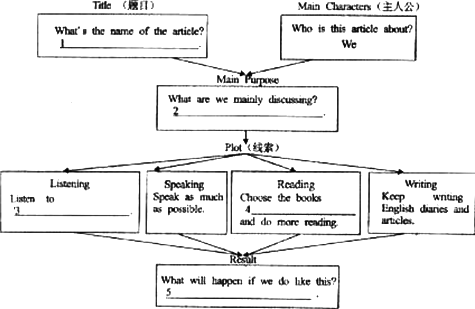
题目列表(包括答案和解析)
We also learn how to _________ well with others at school.
A.get to B.get on C.get down D.get up
Can you swim?Do you like swimming?Yes?Well, how can you learn to swim?I think the best way is to go into the water and learn.I' m afraid you'll never learn to swim just by reading books about swimming or look-ing at others swimming.It's the same with the English study for us kids today.We must practice, practice and practice.
Listening and speaking are very important for beginners.The children in English-speaking countries first listen to others.Then they try to imitate(模仿)and speak.We can listen to English programs on radio.You may just understand a few words.It doesn' t matter.Just be relaxed, try to get the main topics(论题,话题), then the main ideas, then the main sentences(句子), then the key words, then the full meaning.As for speaking, speak as much as you can.
Reading and writing are more important for school students.First we must choose the books we're interested in.A lot of reading will improve your language sense(语感).This is the most important.
Keep writing English diaries(日记).We can also write English articles.You may even post them to English magazines.Don't be afraid of failure(失败).Failure is the mother of success.
Easier said than done.Well, let's do more practice from now on.I' m sure you' ll learn English well in this way.

阅读理解:
阅读下面的短文,根据短文内容,用不超过5个词填写每个空格完成图表:
Swimming and English LearningCan you swim? Do you like swimming? Yes? Well, how can you learn to swim? I think the best way is to go into the water and learn.I' m afraid you'll never learn to swim just by reading books about swimming or looking at others swimming.It's the same with the English study for us kids today.We must practice, practice and practice.
Listening and speaking are very important for beginners.The children in English-speaking countries first listen to others.Then they try to imitate (模仿) and speak.We can listen to English programs on radio.You may just understand a few words.It doesn’t matter.Just be relaxed, try to get the main topics (论题,话题) , then the main ideas, then the main sentences (句子) , then the key words, then the full meaning.As for speaking, speak as much as you can.
Reading and writing are more important for school students.First we must choose the books we're interested in.A lot of reading will improve your language sense (语感).This is the most important.
Keep writing English diaries.We can also write English articles.You may even post them to English magazines.Don't be afraid of failure.Failure is the mother of success.
Easier said than done.Well, let's do more practice from now on.I' m sure you' ll learn English well in this way.

| A.When Katherine was six, she began helping children in Africa. |
| B.Katherine learnt that two children died from malaria one minute. |
| C.Katherine did a lot and helped to raise $ 20,000 for NBN. |
| D.Katherine’s parents helped her make “bed net gift certificate”. |
| A.a 10-dollar note | B.a gift certificate |
| C.an organization | D.a message |
| A.raisinga great deal of money for NBN |
| B.givingpresentations at churches and schools |
| C.explainingthe importance of nets for Africans |
| D.ordering people to learn to use the nets well |
| A.Katherine’s work is very helpful and meaningful |
| B.thespread of malaria in Africa will be more serious |
| C.everychild in Africa gets a net with Katherine’s help |
| D.Katherinehas received much money from NBN |
| 小题1: |
|
| 小题2: |
|
| 小题3: |
|
| 小题4: |
|
| 小题5: |
|
| 小题6: |
|
| 小题7: |
|
| 小题8: |
|
| 小题9: |
|
| 小题10: |
|
| 小题11: |
|
| 小题12: |
|
| 小题13: |
|
| 小题14: |
|
| 小题15: |
|
湖北省互联网违法和不良信息举报平台 | 网上有害信息举报专区 | 电信诈骗举报专区 | 涉历史虚无主义有害信息举报专区 | 涉企侵权举报专区
违法和不良信息举报电话:027-86699610 举报邮箱:58377363@163.com